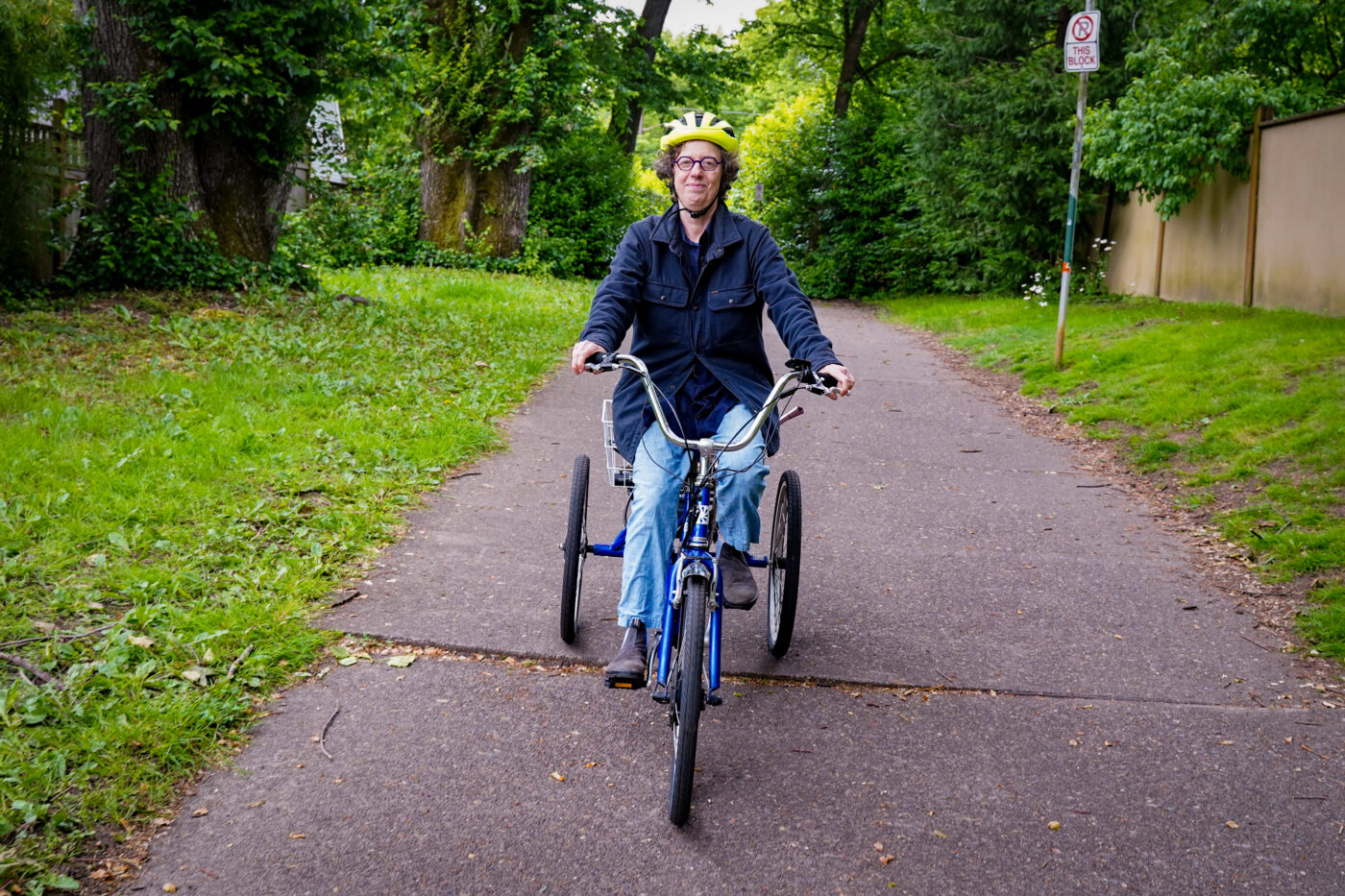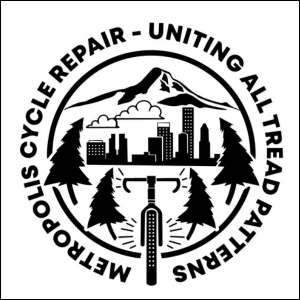Marnie Glickman thinks she has the recipe for progressive political success in Portland. Glickman is a leading candidate for City Council District 2 (North/Northeast) and I met up with her Tuesday for a bike ride and an interview.
Glickman has lived in Portland off-and-on since 1992 when she paid $175 a month for rent on SE 28th and Steele and biked all over. Now 53, and after three decades working in politics and organizing, Glickman is ready to commit to her favorite city. After meeting at her home in the Sabin neighborhood, Glickman wanted to show me a community garden she sits on the board of, and then we rolled over to Irving Park where we sat on two large logs and talked under towering trees while rain fell overhead.
Listen to the episode above or wherever you get your podcasts. I’ve also pasted a few excerpts below…
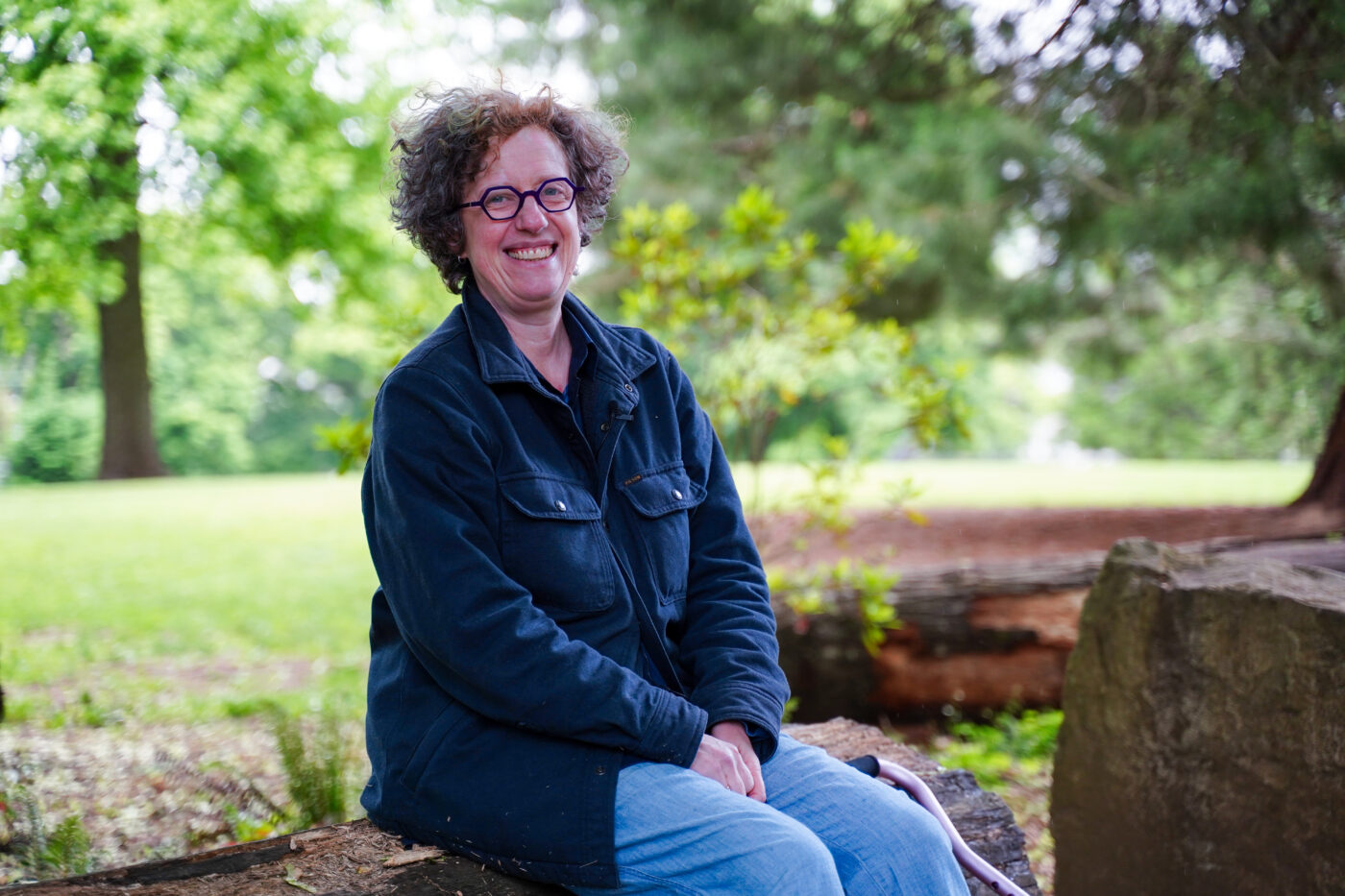

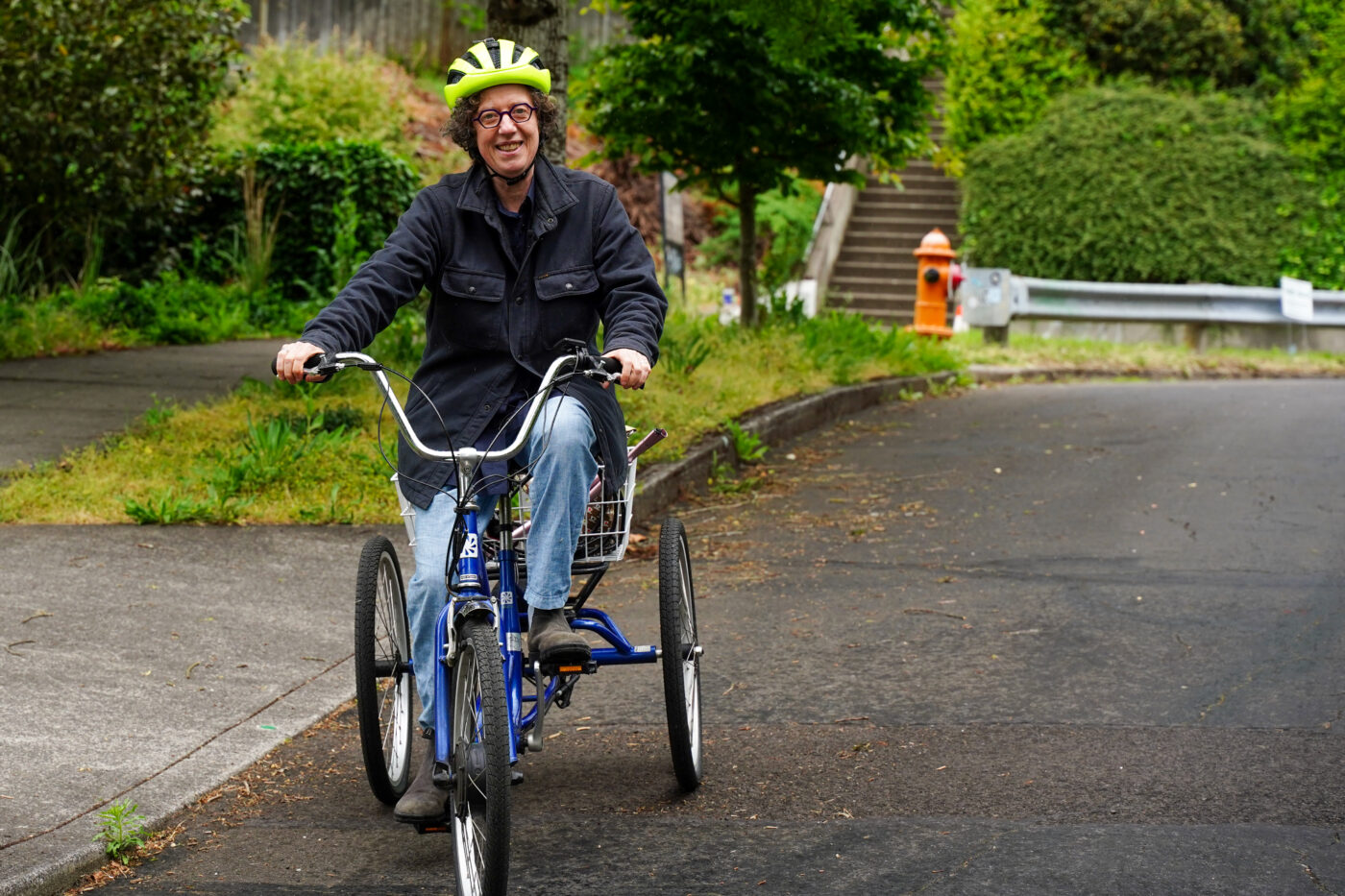
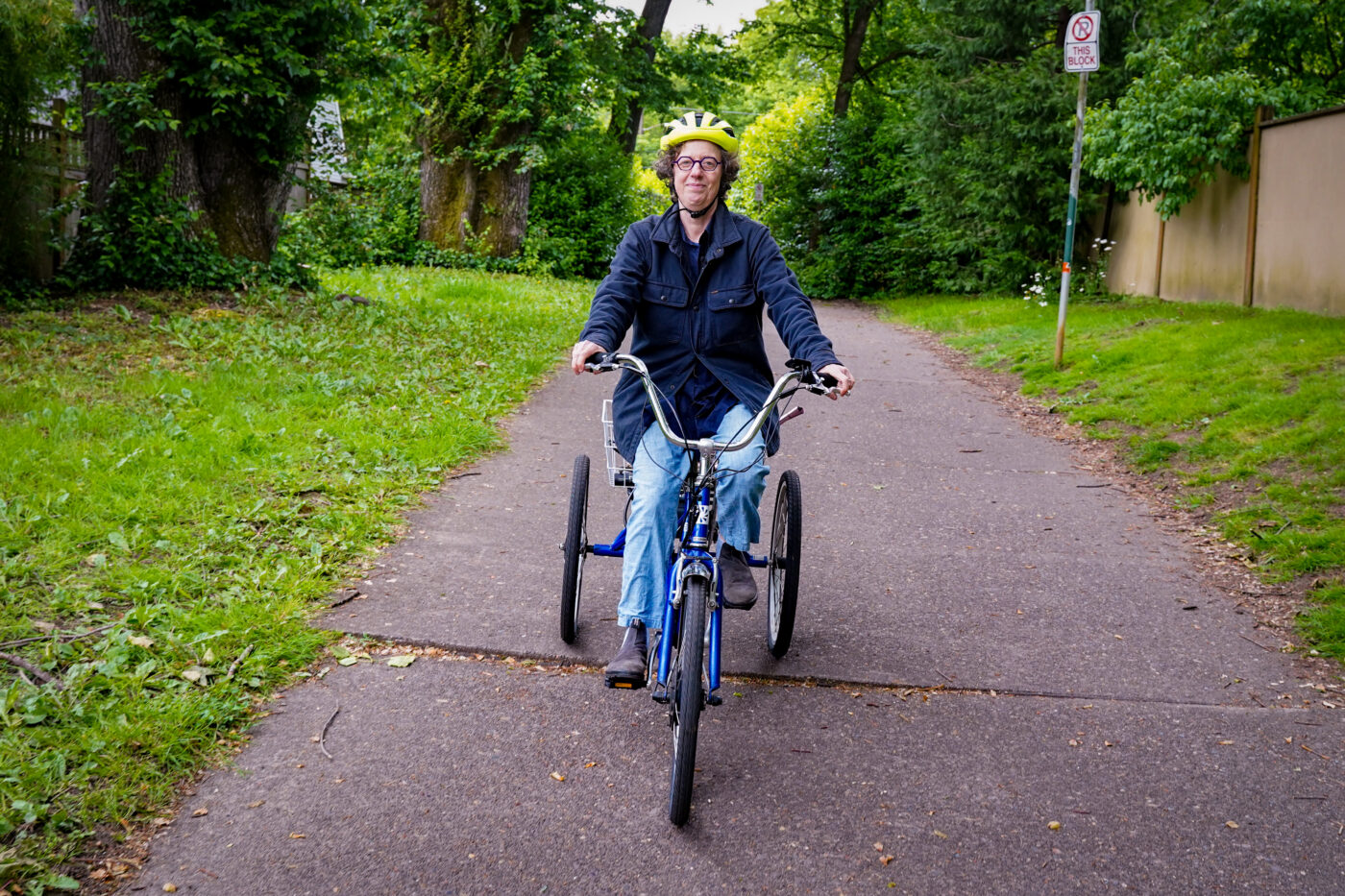


You might be surprised at Glickman’s high showing in small donor contributions thus far because she doesn’t have a major public profile here in Portland. But when you look into her background, it’s clear why she’s bubbled up to the top: Glickman has been in politics and organizing around public interest issues for three decades. She’s worked for several members of Congress and other high-profile elected officials, she co-authored the 2010 Green New Deal, is a former co-chair of the national Green Party and was finance director for Ralph Nader’s 2000 presidential campaign, and served a four-year term as a school board trustee while living in California.
That last job gave Glickman was she described in our interview as the most important thing she’s done in her career so far — leading a campaign to drop the name “Dixie” from a local school district. That fight put her in headlines and helped gird her for Portland politics.
We talked about that and much more in our interview, which you can listen to in the player above or wherever you get your podcasts.
Below is an edited version of some of our exchanges:
You’ve spent decades behind the scenes, why run now?
I decided to run for Portland City Council in district two because we need experienced progressive leadership and City Hall leadership that’s rooted in community, grounded and good government and powered by real progressive values. I know what it’s like to manage a multimillion dollar, complicated public budget. I know what it’s like to be a progressive elected official, and needing to work with others to get stuff done. I also bring some governing skills from having been a graduate of Lewis and Clark Law School. So I know how to make laws and read laws. I think that’s pretty important right now.
Why did you take on the fight to change the name of a school district when the issue had simmered for decades without any progress?
The district was named after the Confederacy during the Civil War. And I decided it was time for us to pick a name that reflected the community’s values. Every time I drove by the “Dixie” sign, I thought about Auschwitz. I’m driving home and there’s a sign that says “Welcome to Dixie.” And that’s a place where people were murdere during slavery. And I knew living there, people were really afraid to admit it to themselves. When Michael Brown was murdered in Ferguson, I was managing a political performance art choir, and working on the Monsanto issues [Glickman organized a successful effort to ban the use of Roundup weed killer in New York State in 2021]. And we went to Ferguson, and sang at the side of Michael Brown’s murder. And so when I flew back and drove by that Dixie sign again, after being in Ferguson, I thought, you know, there is no time for me to make excuses anymore for not doing my part.
How do you respond to people who might look at you, as a progressive candidate and say, ‘We need to get more to the center here, because we got these problems, and progressives haven’t fixed them yet.’?
That’s really important question. Portlanders deserve elected officials who are accountable, transparent, and responsive. Leaders can do that on the left and the right and the center. I’m running in part because we haven’t had that for a while from many or most of our elected officials.
You say you want to “achieve practical results, while never compromising deeply held progressive values.” What was your take on the 2022 lawsuit filed against the City of Portland by Portlanders who said people camping on the sidewalks was a violation of their ADA rights?
As a person with a disability, when I read about that lawsuit, I thought it was disappointing that we couldn’t solve the problems before getting to litigation. Litigation is expensive and should be the last ditch effort to solve real problems. I thought it was a sign of dysfunction in the government that we got to that point.
Do you think it’s possible for Portland to reach 25% bicycle mode share by 2030?
It depends on how the election turns out. I think optimistically we can have a majority of people, seven people elected maybe more who want to make that happen. I would be one of those seven.
Any ideas on how we can do it?
I’ve met a District 2 resident who shared a policy idea that I think is important, which is, figuring out ways to discourage people from driving and using their cars because it’s something we haven’t tried very much of. And I think it would help us by providing more free transit options for kids.
I’m not prepared right now to give you one specific project. I am the kind of person where I need to bring people together to figure this out. I’m not going into this race with a set of the 10 policies I want to make happen. Because what we need first is good government. We need teamwork. We need to figure out how the new government is going to work.
Given what’s happening in Gaza, do you think it is time the City of Portland — or even you, as a person running for council — be stronger in condemning it and calling it genocide?
Well, I’m not going to tell people what words to use. I can tell you what words I use. It is wrong to kill children and civilians en masse with taxpayer-funded weapons from the US and Israeli weapons. It is wrong, it is a global crisis. And so personally, I am having more desire to talk about it. And yeah, it’s really sad. It’s really sad. I would also say we need people in office who are willing to share their personal values and bring people along. And I think most Portlanders believe in peace and most Portlanders don’t think children should be murdered.
I hear what you said about not wanting to tell people the word they should use to describe it. But by not [calling it a genocide], as a person who’s a leader, are you worried that some people may not understand the severity of what’s happening? This is a genocide. And it needs to be named as such. And if we don’t call it that, are we doing enough to stop it?
I’m a lawyer. And so when I think of a legal term, like genocide, I think, ‘Oh do I remember the actual legal definition of genocide?’ So I’m just telling you where I’m coming from. Do I believe in the International Criminal Court? Yes. Do I think countries should arrest [Israeli Prime Minister Benjamin] Netanyahu? Yes.
I was raised Jewish, so I feel a responsibility as a Jewish voter for peace to talk about it. And I’m willing to lose votes for it. That’s what happened in Dixie. We elect leaders to make hard decisions, even if they only help a minority of the people. And so that applies to many issues facing the city. And my [political] independence is relevant because, as we know, money still drives politics here in Portland. And we need people to stand up — in spite of money, in spite of fear — and focus on what’s really important to me, that’s what being a leader is. So I decided to run because I know how hard it is to make big things happen to make real change. And I love Portland so much that I’m ready to do it again.
There are a lot of candidates in this race, why should someone choose you?
I have real progressive governing experience and governing skills. I am a grassroots, people-powered candidate and a grassroots people-powered leader. And as the campaign goes on, I will be knocking on doors with everyone and persuading people with my positions on issues — and not just my cool trike.
Listen to the full episode in the player above or wherever you get your podcasts.
